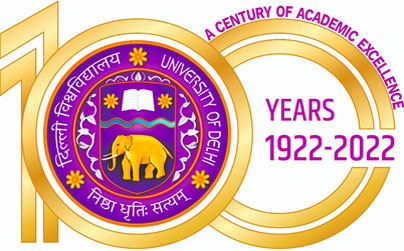VAC: Culture and Communication
Credits
02
Lecture
01
Tutorial
0
Practical/Practice
01
Eligibility criteria
Pass in Class 12th
Pre-requisite of the course
NIL
- To focus on traditional values disseminated from Indian cultural heritage.
- To understand the interconnections between the legacy of our past and needs of our contemporary society.
- To learn to adapt, interact and celebrate our diversity and pluralistic culture.
- To develop communication skills in speaking, listening, reading and writing and apply them in our quotidian life as young citizens of contemporary India.
- To integrate ethical values and life skills.
- Students will be able to appreciate the relevance of ancient Indian wisdom and core ethical values in our contemporary life.
- Students will be able to engage in a dialogue between the past and the present and inculcate the best principles towards a meaningful life.
- Students will be encouraged to involve themselves in team work and group activities to address challenges faced in metropolitan cities.
- Students will be able to develop communication skills, that is, analytical reading, empathetic listening, considerate speaking as well as informed writing.
- Extension activities will equip the students, drawn from diverse backgrounds, with life skills and confidence to integrate with a multicultural environment and work towards an inclusive community.
- Students will be encouraged to envisage and work towards an ethically robust society and thereby strengthen the nation.
UNIT - I Ethical Values from Indian Cultural Heritage (3 Classes)
- Vasudhaiva Kutumbakam
- United We Stand, Divided We Fall
- Ek Bharat, Shresht Bharat
UNIT - II Developing Life Skillse (4 Classes)
- Empathy
- Adaptability
- Conserving our natural resources
- Sharing knowledge resources
UNIT - III Effective Communication in Everyday Life (8 Classes)
- Empathetic listening
- Considerate speaking
- Analytical reading
- Informed writing
As hands-on experience is an essential component of the course, this section will focus on the practical aspects to correlate with the fundamental principles and learnings of the theory portion. Students will be encouraged to use the communication tools learnt through Unit 3 and corroborate. the continuities of core principles studied in Unit 1 and 2.
- Students will be asked to conduct surveys/interviews in their neighbourhood or commuting routes to assess the nature and quality of negotiating our cultural diversity and pluralist traditions.
- Students would be assigned visits to old-age homes, hospitals, cancer wards, etc. to interact and write about their experiences with old people, caregivers, patients, nursing staff, helpers, etc.
- They will also be assigned visits to historically important places and monuments within the city and also converse with the tourists in order to trace a comprehensive view of the rich cultural history of India. They may create video documentaries, take and record tourists' interviews and/or write a journal entry of the visit using the communication skills learnt.
- Students shall make group presentations or individual reports on the activities undertaken. Discussions with classmates and the teacher shall be undertaken to evolve clarity of vision on the ethical values and effective communication skills learned through this course.
- Any other related activity.
- Aurobindo, Sri. Introduction To The Gita. Sri Aurobindo Ashram Press, 2017. pp 23-40
- Dhanavel. S.P. English and Soft Skills. Orient Black Swan, 2010.
- Haksar, A. N. D. ‘Chanakya Niti Shastra’, Chanakya Niti. India, Penguin Random House India Private Limited, 2020.
- Malik, Keshav. “A Dehumanized Environment”. Culture of Peace: Experience and Experiment, edited by Baidyanath Saraswati. Indira Gandhi National Centre for the Arts, New Delhi, 1999. pp 77-79
- Murthy, Sudha. ‘How to Beat the Boys’, Three Thousand Stitches: Ordinary People, Extraordinary Lives. Penguin Books, 2017.
- Ramanujan, A.K. ‘A Flowering Tree’, Cultural Diversity, Linguistic Plurality & Literary Traditions in India. Department of English, OUP, 2015. pp 125-138.
- Vande Mataram Song from Chatterji, Bankimcandra. Anandamath, or The Sacred Brotherhood. Translated by Julius J. Lipner, Oxford University Press, 2005. pp 297-299.
- Vivekananda, Swami. “Response to the Welcome and Address at the Final Session.” Swami Vivekananda: A Contemporary Reader, edited by Makarand R. Paranjape, Routledge, New Delhi, 2015, pp. 3–4,18–19.


